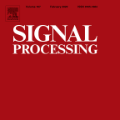We develop a compositional theory of nonlinear audio signal processing based on a categorification of the Volterra series. We augment the classical definition of the Volterra series to be functorial with respect to a base category whose objects are temperate distributions and whose morphisms are certain linear transformations. This leads to formulae describing how the outcomes of nonlinear transformations are affected if their input signals are first linearly processed. We then consider how nonlinear audio systems change, and introduce as a model thereof the notion of morphism of Volterra series. We show how morphisms can be parameterized and used to generate indexed families of Volterra series, which are well-suited to model nonstationary or time-varying nonlinear phenomena. We describe how Volterra series and their morphisms organize into a functor category, Volt, whose objects are Volterra series and whose morphisms are natural transformations. We exhibit the operations of sum, product, and series composition of Volterra series as monoidal products on Volt and identify, for each in turn, its corresponding universal property. We show, in particular, that the series composition of Volterra series is associative. We then bridge between our framework and a subject at the heart of audio signal processing: time-frequency analysis. Specifically, we show that an equivalence between a certain class of second-order Volterra series and the bilinear time-frequency distributions (TFDs) can be extended to one between certain higher-order Volterra series and the so-called polynomial TFDs. We end with prospects for future work, including the incorporation of nonlinear system identification techniques and the extension of our theory to the settings of compositional graph and topological audio signal processing.
翻译:暂无翻译





